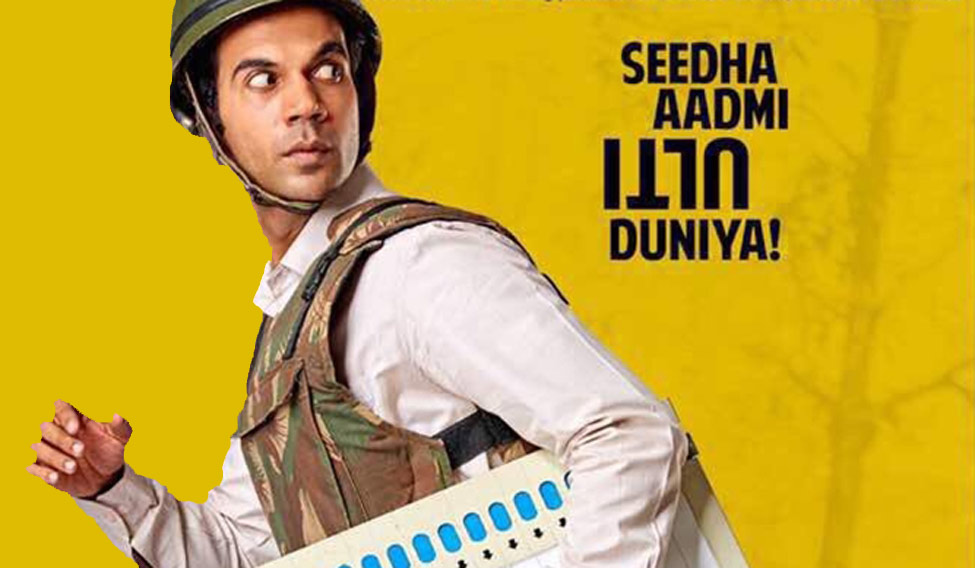Actor Pankaj Tripathi, in a recent conversation with me, said that when Rajkummar Rao and he are performing together, it’s like a jugalbandi―if he is the sur, Rao is the taal. They understand each other’s improvisations so well that it doesn’t take time for either of them to play along. Sometimes, he said, the directors let the actors, who have done a couple of projects together (Gangs of Wasseypur, Bareilly Ki Barfi and now Newton) indulge in improvisation because it brings out the best in them.
Currently, both the actors are in top-form, having had multiple releases this year in which their performances have been hugely applauded. However, in Newton, directed by Amit V. Masurkar, the two actors share the maximum screen space together and seem like a perfect pair for an acting-jugalbandi―their superb acting making the film a better fare. The characters that they play―Newton Kumar, a self-righteous clerk who takes over as the presiding officer at an election booth in a small, Naxal-infested village in Chhattisgarh, and Aatma Singh, head of the Central Reserve Police Force (CRPF) commandment that would be with the election officers led by Newton for their safety in the jungles often at threat from the Naxalites―are in contrast with each other.
Newton, whose original name is Nutan that he changed after his peers constantly mocked him for it, is a perfect example of honesty―incorruptible even in the face of adversity and someone who will follow the rules even when his life is at threat―a misfit in a mostly corrupt government sector. Early on in the film, while talking to an election instructor (Sanjai Mishra, who is at his philosophical best in the small part he plays), Newton asserts his intention to bring about a change with his righteousness. Mishra doesn’t buy it. “It’s the least that's expected of you,” he tells him.
The mood of the film is set―Newton, arrogant about his honesty, is about to come across many situations where he will be mocked for it. At a meeting for an arranged marriage, Newton gets up from his seat on knowing that the prospective bride is just a little over 16. He strongly opposes the idea of marrying a minor. Later on, he wakes his support staff on election duty at 4:30am sharp so that they aren’t late in reaching the booth, further away from the place they were camping in the night. Rao shows sincerity in portraying Newton―the curly-hair look (which Masurkar says Rao came up with) aside, he blinks his eyes in a distinct way, adding some sort of layering to the character.
Tripathi’s Aatma Singh, however, isn’t someone who goes by the rulebook. He has been in the sensitive areas of Sikkim, Nagaland, Jammu and Kashmir, where insurgency strikes are expected more often, and takes a practical approach. Playing an age-appropriate role after a long-time of portraying fatherly roles, Tripathi’s pitying gaze on Newton when he talks about rulebooks and integrity, is noteworthy. His credibility as an actor comes out in these scenes when he, without saying much, says a lot, or delivers a punch with one-liners like “lal salad” (thinly-cut beetroot slices) during lunch, a sarcastic pun on the greeting of the Naxals. When Newton is in a hurry to report to the booth, Aatma Singh offers a meal of eggs and bananas and asks him to ease. On another occasion when Newton fiercely takes over one of their guns and opposes the force, Aatma waits patiently and doesn’t say much either. He attacks and makes his stance clear only when Newton is off-guard.
And if the strong performances of these two main actors makes the film worth a watch, the storyline and direction, is no less a hero. The second film from Masurkar surprises you because it is a complete contrast from his first, Sulemani Keeda (2014)―a slacker comedy about two urban youth peddling their middling script. It’s nowhere close to it. If the first was shot in the safe, closed confines of Mumbai, Newton pushes the boundary by going to the real locations. If Sulemani Keeda was a fine, urbane tale with a limited cast, Newton forges ahead in not just managing an ensemble cast of a few key people, but also by casting a fine mix of locals who are instrumental in taking the plot forward. Anjali Patil’s Malko Netam, a tribal from the area helping with the polling, adds a layer to the film uplifting it. A Gondi-speaking Malko, aware of the violence from both the parties―the Naxals and the government―makes the story more real.
Raghubir Yadav’s Loknathji, a support staff on election duty is someone you would find in your everyday life. He takes out a pack of cards to while away time as everyone waits for the only 76 voters from the area to turn up. His card game plays an important part in the narrative. He talks about his interest in writing stories, his next involves a similar village where people have turned into zombies (he pronounces it “zumbies”)―everyone wants a little influence of pop culture. He makes a profound statement when he tells Malko, also a teacher in the area struggling to explain things in Hindi to the Gondi-speaking population, that there’s no point in teaching Hindi, “It’s English that should be taught” as everybody “now speaks in English”.
Masurkar’s screenplay, written along with Mayank Tewari, is fresh and makes a strong statement as a political satire, a genre rarely explored. It’s a fine film that not only touches you because of its characters rooted in reality, but also forces you to think about the everyday situation in the country that can put you at risk. Or how just being virtuous in these tough times can backfire. Newton suffers too, but he doesn’t change. He, with a sprained neck, calmly responds at the end, “Yeh mere actions ka reaction hai!”
Film: Newton
Director: Amit V. Masurkar
Starring: Rajkummar Rao, Pankaj Tripathi, Anjali Patil, Raghubir Yadav
Rating: 4.5/5







